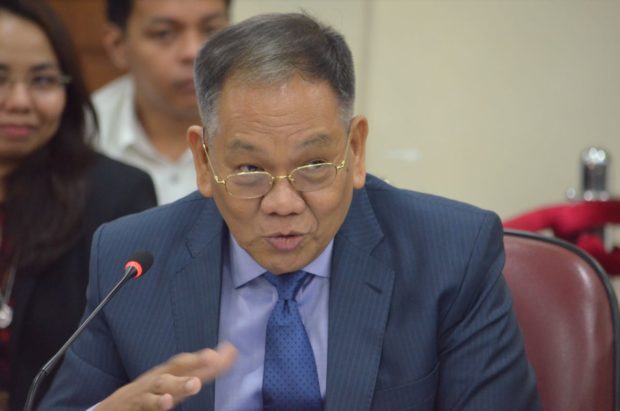Associate Justice Diosdado Peralta has agreed that Chief Justice Maria Lourdes Sereno’s creation of a Supreme Court technical working group should be blamed for the delay in the release of retirement benefits to the surviving spouses of deceased judges.
Meanwhile, Associate Justice Samuel Martires, while stopping short of criticizing Sereno, suggested that families affected by the delay could file administrative cases against members of the judiciary who have “slept on the job.”
Peralta and Martires were the latest of Sereno’s SC colleagues who appeared before the House of Representatives justice committee’s hearings to determine probable cause to impeach her and try her before the Senate.
During the resumption of proceedings on Monday, Deputy Speaker Gwendolyn Garcia said Sereno’s creation of the TWG delayed the resolution of 29 applications for benefits for at least one and a half year.
This was despite 271 applications being resolved without a hitch prior to Sereno’s creation of the TWG in the aftermath of the issuance of conflicting SC rulings.
The legal question pertained to whether all spouses of judges, even those widowed prior to the effectivity of Republic Act No. 9946 on Feb. 11, 2010, were entitled to survivorship benefits.
The issue of the retirement benefits was only resolved when the SC promulgated its Sept. 27 en banc ruling to reconcile the conflicting rulings and clarify the proper applicability of RA 9946 for all cases.
The resolution, captioned Administrative Matter No. 17-08-01-SC, was penned by Martires, who said he “did not know” how the issue was handled prior to his appointment only last March.
Court Administrator Midas Marquez said the pending applications for benefits were finally approved after Martires resolved the matter.
For Peralta, the TWG was not necessary as he found the law clear enough that survivorship benefits must be granted to the spouses of judges who died prior to the law’s effectivity.
“The law is very clear eh… I do not know why there was even a technical working group!” he said.
Peralta said that before the TWG was created to recommend the SC’s course of action on future claims, the justices only needed a weekend to review applications and recommend their approval during the full court session.
Without naming any official, Martires said: “Why don’t you just file administrative cases against any personnel of the Supreme Court who slept on his or her job, who was negligent?”
“It’s time to cleanse the ranks not just of the executive or the legislative, but also the judiciary. We keep on hearing about justices being corrupt… but nothing [happens], everyone’s scared,” he added.
Martires pointed out that the law, likely referring to the Code of Conduct and Ethical Standards for Public Officials and Employees, required officials to promptly act on written requests.
Though he admitted the SC’s disposition of the cases was “slow” due to the sheer volume, Martires questioned if the committee on retirement benefits “should take two years.”
In faulting Sereno for the delays, complainant Lorenzo Gadon said: “It’s a simple thing. Even with my eyes closed, I could have decided on those [applications].”
But, Sereno’s legal team, in a statement, said that throughout the discussion, “there was no evidence or indication that the Chief Justice tried to control or influence the TWG work in any way.”
“While the discussion is interesting, it is irrelevant to the charges against Chief Justice Maria Lourdes Sereno,” Sereno’s lawyers said.
RELATED VIDEO
